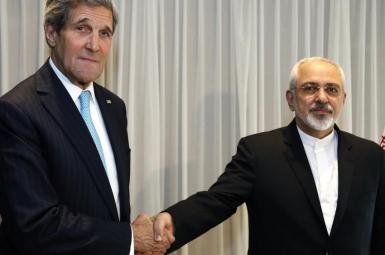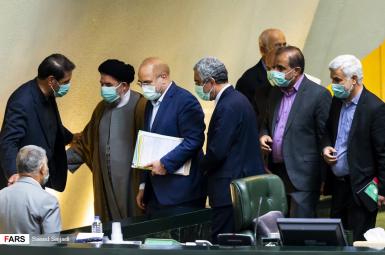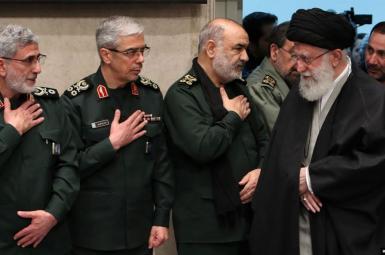
Iran's Government Cheers Guards For Showing 'Wisdom' In Zarifgate Scandal
Accusing Iran International TV of waging a "psychological war against the people of Iran," Government Spokesman Ali Rabiei has praised "military authorities, particularly the Revolutionary Guards (IRGC)" for thwarting the conspiracy to create discord in Iran by publishing a controversial leaked audio file of Foreign Minister Mohammad-Javad Zarif.
In a commentary published Saturday in the government newspaper Iran, Rabiei wrote that an alliance of ''ill-wishing oil [-producing] countries [meaning Saudi Arabia], the Israeli regime and American radicals" had sought a "military invasion” of Iran since Donald Trump became president in 2017.
Iran International TV, which on April 25 broadcast an audio file of an interview with Foreign Minister Mohammad Javad Zarif, was the propaganda arm of this alliance, he wrote.
Rabiei urged Iranian politicians − "not as the government spokesman but as a concerned citizen" − not to "resort to allegations" or to just blame the incident on "spies."
"Let's not fall in the great trap of the thieves and publishers [of the audio file]," he insisted. Rabiei wrote that in the face of "psychological war” against the people of Iran, "military authorities, particularly the Revolutionary Guards” were to be praised for thwarting the conspiracy.
Zarif’s interview was given as part of an oral history project on the basis it would remain confidential until after the government of President Hassan Rouhani left office in the summer. But Zarif’s comments over the role of Qasem Soleimani, the Guards general killed by the US in Baghdad in 2020, and his suggestion that Russia attempted to attach last-minute conditions to the 2015 nuclear agreement with world powers have been seized on by government critics as June’s presidential election approaches and diplomatic efforts continue in Vienna to revive the nuclear deal.
Like Rabiei, vice-President Es'hagh Jahangiri has downplayed the significance of the frustration Zarif displayed in the interview. "I believe that this was a Saudi-Israeli conspiracy kickstarted by [Iran] International," he said in a virtual discussion on Friday evening on the Clubhouse application.
Jahangiri said the differences between diplomats and soldiers were normal and were resolved in Iran by Supreme National Security Council (SNSC). Jahangiri praised both Zarif and Soleimani as part of the "national wealth."
"Let's not let them create a false dichotomy for us," he continued. He called on Iranians "not to undermine the person [Zarif] in charge of talks with six world powers" to revive the nuclear agreement and to remove the draconian sanctions imposed by Trump after withdrawing from the deal in 2018.
Many hardliners and opponents of Iran’s 2015 nuclear deal, the JCPOA (Joint Comprehensive Plan of Action, have seized on the leaked tape as a stick with which to beat the Rouhani government. Some have called Zarif a "seditionist." Parliamentarians have demanded legal action against him, and there has been an anti-Zarif rally in Mashhad(link is external).
Thursday brought the resignation, or sacking, of Hesamoddin Ashena, the head of the Center for Strategic Studies, the body that organized the interview with Zarif, which was conducted in March by economist Saeed Laylaz.









